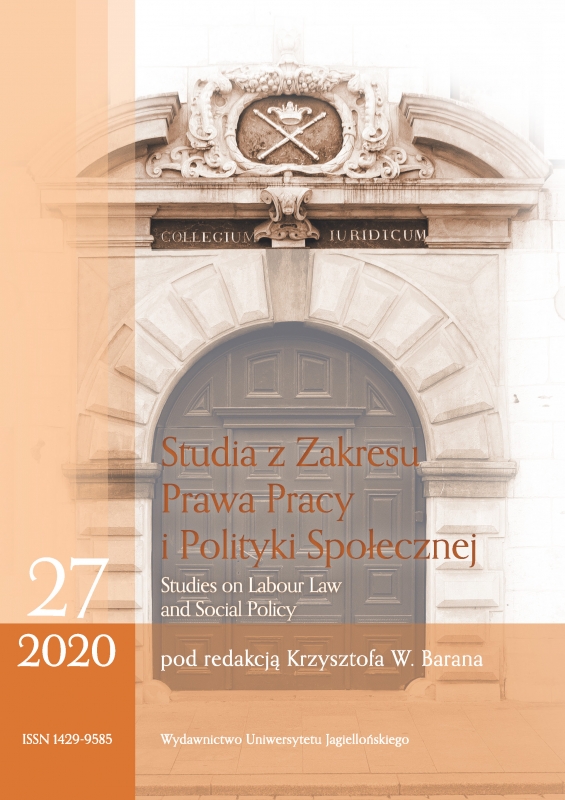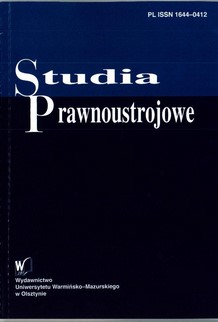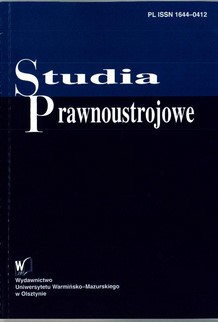
We kindly inform you that, as long as the subject affiliation of our 300.000+ articles is in progress, you might get unsufficient or no results on your third level or second level search. In this case, please broaden your search criteria.



The following research goal is to compare the state of research and scientific findings concerning the human rights of a “working man” in Poland and in France, with the use of a library search. After reviewing the French manuals on employment law it is known that the subject of the “working man’s” human rights is a subject which is common in the academic field there, subject to much attention (Dockes 2018). Even a cursory lecture of the legal bibliography entries confirms the weighty importance of the issue of human rights in labour law (Didry 2018, pp. 241–264). Meanwhile in Poland the state of research is saddening. Not only there are no studies, but there is even no academic discussion in the field, moreover, it is even actively avoided. Of course one has to ask: why? What is the reason for this approach of the Polish legal science to the key subject of “working man’s” human rights in Poland? These are the questions that I try to answer herein.
More...
Any legislation must be assessed from the point of view of its practicability. Legislation and the application of law are closely correlated. The law must be the law in action. Based on this assumption, the overall assessment of the statutory model of the powers vested in a trade union organization is largely negative. The legislator did not provide effective tools, i.e. legal mechanisms enabling the functioning of company trade union organizations at the majority of Polish employers, and thus did not create the legal conditions for the functioning of proper and intended relations between the entities of collective employment relationships. This results, among other things, from a failure to adapt trade union legislation to the dynamically changing socio-economic conditions and needs of the modern labour market. Lack of the legislator’s activity in this respect raises concerns as to the future of the trade union movement in Poland.
More...
The article aims at presenting the reconsidered model of association of public servants under the Polish legal system. In the past, there was a statutory imposed limiting monism in the trade union movement of military services officers. Since 2019 trade union pluralism has been introduced for the Police, Border Guard, and Prison Service officers, which is analyzed in the paper. Another issue discussed in this article is the right of association of persons employed in civil public administration.
More...
The amendment to the trade union act, which entered into force on January 1, 2019, has undoubtedly made the most far-reaching changes in collective labour law since at least the late 1980s and early 1990s. One of the structures that has undergone transformations is the representativeness of trade unions at various levels. At the same time, the legislator amended the Act on the settlement of collective disputes, however, he has not decided to introduce representativeness to it as one of the requirements for conducting a collective dispute. The study is intended to attempt to answer the question whether this abstinence is justified or whether further changes to this act should be postulated, including in terms of taking into account the diversity of rights of trade union structures due to having representativeness.
More...
The subject of the study is the impact of the amendment to the Act on trade unions on the procedure for concluding an agreement regarding employee participation in the management of European business entities. The author concentrates cosiderations primarily on European company, which is called the “flagship of European company law”. In connection with a similar regulation, considerations were also referred to the European cooperative and the company formed as a result of a cross- order merger. Due to the size of the issue and the separate nature of the regulations, the participation of employees in European works committee in community-wide enterprises and groups of these enterprises was omitted. The author intends to determine whether the regulations introduced by the amendment to the Act on trade unions are consistent with the other solutions provided for in the laws concerning European business entities. For this purpose, she examines some examples of regulations leading to the conclusion of an agreement on the participation of workers in management of the company in Europe.
More...
In the context of recent GSP changes, especially the Trump Administration’s steps relating to certain beneficiary countries, it is timely to assess the effectiveness of this unilateral mechanism. In particular, the academic question connected to the impact of the GSP on social development and human rights in the beneficiary countries is the key issue. It is also interesting to what extent the threat of blocking imports or the withdrawal from the scheme can give rise to policy change regarding labour standards. This article aims to analyse the legal basis, and compare the EU’s and the US’s GSP labour provisions. The author applies critical reasoning and comparative analysis with a view to showing the differences between both countries. She focuses her attention on advantages and disadvantages of the GSP schemes—not only those currently in effect in the US and the EU, but also from a historical perspective.
More...
Outsourcing is a phenomenon that combines business strategies, structural characteristics of companies and working relationships. In Italy outsourcing is widespread, facilitated by a legislation that has removed limits and made the outsourced production and the management of the workforce easier. As a result, employment, working conditions and industrial relations in the value chain have been affected by this phenomenon in terms of high fragmentation and work protection. In this scenario the industries which have been more negatively impacted by the phenomenon are the ones under high pressure from large retailers and the demand for low cost goods, such as the logistics and the meat sector. The article aims at presenting the analysis of outsourcing phenomenon in Italy, by examining its causes, its mechanism and its consequences on workers and their trade unions. In this context, an inadequacy of the present regulatory approaches in addressing the phenomenon of outsourcing has been observed. Its content has been enriched with the analysis of a case study, called “Modena system,” which unveils the weaknesses of outsourcing in a specific sector, the meat industry, and the concrete responses taken by the public actors and trade unions to deal with them.
More...
This article deals with the misdemeanour liability which may be imposed in the event of a lack of payment of a remuneration to a posting worker when a due amount of money for such a remuneration is regulated by a Member Stater other than Poland. The authors analyse the aforementioned problem from the perspective of the Polish misdemeanour law. Having done so, the authors have perceived two problems: lex loci of an act and availability of an interpretation of a legal penalizing norm stemming from the EU directive. The former problem was solved by accepting the proposition that lex loci for a negligent default of payment of a remuneration by an employer of a posting worker is always the country of her principal office which in practise is always the country from which a posting worker is being posted. The latter, by accepting the proposition that a regulation on remuneration for posting workers, which is a body of law of a foreign country, should be deemed as comprising of overriding mandatory provisions, in turn those provisions may be used to interpret a legal norm encompassed with a misdemeanour sanction because those overriding mandatory provisions have theirs base in the EU law that is part the Polish legal system.
More...
Given that the civil service legislation is quite restrictive when it comes to the workplace of the civil servant, the question arises, what similar regulatory situations in the labor law could be applied in the field of civil service to meet the current conditions on the Romanian labor market.
More...
The object of the study the findings of which are presented in this article is the written statements of reasons of selected resolutions issued by the Polish Supreme Court and the dissenting opinions submitted in opposition to them. The situation of this type constitutes a relationship of two or more standpoints regarding a problem presented to a bench, referred to in the text as an opposition. The aim of the article is to offer a typology of opposition that can be reconstructed as a result of a dissenting opinion being submitted. It encompasses axiological oppositions in the strong sense and interpretation oppositions (axiological in the weak sense). Axiological oppositions in the strong sense take the form of unipolar or bipolar opposites. The examined group of resolutions has given grounds to also isolate doctrinal disputes as well as disputes over the legal nature of a given institution. The article, however, focuses only on axiological opposites. The cognitive value of the conducted analyses lies: (1) in the identification of the limited role of interpretation guidelines on the level of written statements of reasons, and (2) in the identification of the dissimilarity of situations where a votum separatum becomes an expression of an equal standpoint on the grounds of ius interpretandi considered in broad terms and situations where a votum separatum is a dissenting opinion not so much against a decision that has been made but against the legal regulation that has required this decision to be as it is.
More...
Social labour inspectorate, as a special form of unionised representation of employees’ interests, has the right to control employers in the field of their compliance with the provisions of the labour law in place. Exercising this controlling function involves the need for a social labour inspector to access the information and documents that may contain personal data of employees. The study advances a thesis that a social labour inspector is an entity processing personal data of employees on behalf of a company trade union organisation – who is the controller of these data, and the grounds for the processing of personal data of employees are the relevant provisions of the GDPR. The theses proposed in the study aim to challenge the Constitutional Tribunal’s standpoint regarding a social labour inspector’s right to obtain personal data. The problems addressed in the study have not been a subject of the existing views of legal academics and commentators, nor have they been covered in the established line of judicial decisions yet.
More...
The purpose of the paper is to analyse issues related to personal data processing within the framework of co-operation between the employer and trade unions in individual employment matters. The issues of personal data processing in collective relations are becoming more important especially due to lack of detailed legislative solutions, which results in the necessity to apply the general provisions of the GDPR as well as the latest changes to the Trade Unions Act. Pursuant to these changes, not only employees, but also persons performing gainful employment who are not employees can create and join trade unions as well as can be defended by the trade unions. The legislator frequently finds it difficult to adjust the protection of personal data to the specificity of collective relations, and the way in which the relationship between employers and trade unions is shaped in individual employment matters raises many questions in the context of personal data protection. The issue in question has not been explored in depth in the professional labour law literature. Thus, research on this subject is novel and justified from both the theoretical and the practical perspective. In the article, the formal-dogmatic method of research was used.
More...
Although the increased performance in digital platform work has been recorded only recently, the numerous problems related to employment law and social welfare protection of crowdworkers are not new. Due to diverse issues in classifying specific individuals as employees, “atypical” workers and crowdworkers have encountered many problems while attempting to obtain employment law and social welfare protection. Despite numerous differences, majority of countries have made employment law protection available to those digital platform workers who meet the requirements of the legal definition of “an employee” (or “a worker”, as explicitly designated in specific legislations). In other words, the legal definition of an employee or a dependent contractor provides entrance into the area of employment law protection. However, both national and international legislators have demonstrated a certain degree of inertness in terms of avoiding to adjust the legal concept of “an employee” (or a subordinate, as defined in some legislations) to new social and economic circumstances. Considering the traditional concept of “employee”, a crowdworker cannot be designated as a subordinate; consequently, digital platform workers do not fall under the scope of relevant provisions of labor, social care and tax law. On the other hand, when it comes to traditional legal categories, classifying crowdworkers as independent contractors does not diminish their need for adequate protection, primarily in terms of fair financial compensation for work, clearly limited working hours, health care and safety at work, protection in case of illness, injury at work, maternity leave or freedom of association. Therefore, national legislators should revise the justifiability and proportionality of legislation applied to economic cooperation, and consider the specificities of economic cooperation business models and tools that can be used for resolving ample issues in defining employment law protection of crowdworkers and identifying entities that may have the legal status of the employer.
More...
This article shall provide an analysis of the detainees’ employment, as an indicator oftheir ability to reintegrate into society after release. One of the most acute problems of society isthe recidivism, its control and solutions to reduce the crime rate. Over time, work has beenconsidered one of the most concrete methods of re-education, both in prison and after release. Intoday’s society, work is recognized as human, social, psychological and economic value, beingestablished as a human right along with other fundamental rights. Thus, the purpose of executionof sentences with deprivation of liberty is to prevent the commission of new crimes and forminga correct attitude towards the rule of law, towards the rules of social coexistence and towardswork, in order to reintegrate detainees into society.Social policies, programs and projects have been developed in this area, but not beingintegrated, their effects were not visible or quantified. To this situation is added the pandemiccaused by SARS-CoV-2 virus, which places in the background the concern for the category ofdetainees who have been released and the risk of recidivism that it presents. In this context,against the background of lack of training and qualification, increasing poverty, decreasing thesupply of jobs, limiting movement and labor migration in developed areas, an increase in crimeand recidivism in the coming years is expected. At present, the educational and therapeuticprograms carried out in penitentiaries is no longer in line with social reality, so that criminalstrategies and legislation need to be redesigned and viable solutions found for socialreintegration of detainees and for preventing the risk of recidivism.
More...
The increase in consumer demand for meat in Europe has led to the development of many new slaughterhouses and meat product plants, and Poland remains the 7th largest exporter of meat in the world, with a share of 4.3%. Unfortunately, industrial animal farming and meat production involves the risk of exposing workers to many a harmful bacteria, fungi, viruses and parasites of animal origin. This paper presents the most important zoonotic factors and the routes of their spread in slaughterhouses, meat cutting and meat processing plants, and discusses basic preventive measures.
More...
The concept of innovation means, according to OECD definition, implementation of a new or significantly improved product, service or method, e.g. of management. The article presents the level of implementation of organisational innovations in Poland in comparison to other countries. In the light of these statistics Poland takes one of the worst places in terms of innovativeness. Meanwhile, innovativeness may also be indicated by the ability to react quickly to changes in the company’s closer and further environment and to quickly implement previously unused methods and work organisation in order to ensure continuity of operations. Such skills were demonstrated by Polish enterprises in the face of the COVID-19 outbreak.
More...
The purpose of the investigations described in this study was the analysis of the exemptions granted to the Social Insurance Institution concerning the payment of enforcement fees resulting from the conduct of civil enforcement proceedings concluded with discontinuance. The scope of the study has been limited to situations in which, at the request of the Social Insurance Institution, enforcement proceedings are conducted in respect of their operation specified in the act and conducted by this entity, and only to situations where the proceedings are discontinued due to the lack of the activity needed to continue the proceedings or failure to demand the suspension of proceedings within six months. The purpose of the research is to answer the question whether the judicial officer can effectively charge the Social Insurance Institution with an enforcement fee in connection with the discontinuance of enforcement proceedings under Article 824 paragraph 1 point 4 of the Code of Civil Proceedings. The conducted research leads to the conclusion that de lege lata neither Article 114 paragraph 4 of the Act on the social insurance system in connection with Article 45 paragraph 1 of the Act on enforcement fees nor any other provision introduces a sufficient legal basis for exempting the Social Insurance Institution from the enforcement fee when the enforcement proceedings are discontinued as in the described situation.
More...
The paper discusses the employer’s right to suspend the pursuit of their economic activity by taking into account applicable provisions outlined in the Act of 6 March 2018: Business Entities Law. So far this issue has been closely analysed neither in labour law literature nor in economic law scholarly writings. For this reason, it seemed appropriate to attempt to establish to what extent mechanisms contained in the mentioned Act make possible a rational exercise of the right to suspend the pursuit of economic activity by an employer. The analysis has shown that Article 22 of the Business Entities Law does not have a quality of completeness. De lege lata it seems therefore reasonable to assume that to matters not covered by the provision in question rules of the Labour Code regulating leaves connected to parenthood should apply. In particular, these matters include issues related to rights and duties of an employee and an employer that come into play in the case where an employee finishes taking advantage of a leave related to parenthood or in the case where an employee applies to combine the parental leave or the leave for raising a child with carrying out a job for an employer who has granted such leave. A different interpretation of Article 22 of the Law of Business Entities would cause that due to its general character it could become a dysfunctional factor in applying the mechanism of suspension of economic activity in practice. In my opinion, a different interpretation would also result in the breach of the principle of equal treatment of employers.
More...